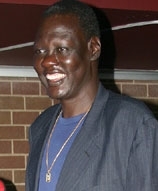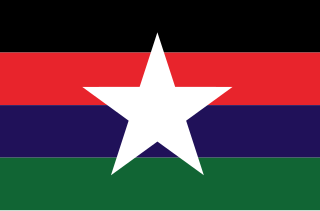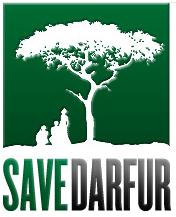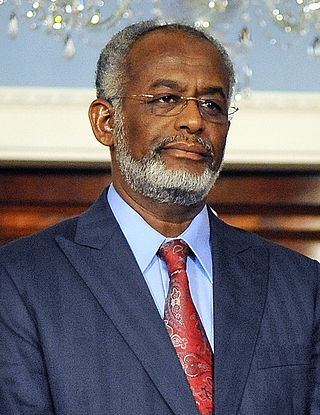
Sudan, officially the Republic of the Sudan, is a country in Northeast Africa. It borders the Central African Republic to the southwest, Chad to the west, Egypt to the north, Eritrea to the northeast, Ethiopia to the southeast, Libya to the northwest, South Sudan to the south, and the Red Sea. It has a population of 45.7 million people as of 2022 and occupies 1,886,068 square kilometres, making it Africa's third-largest country by area and the third-largest by area in the Arab League. It was the largest country by area in Africa and the Arab League until the secession of South Sudan in 2011; since then both titles have been held by Algeria. Its capital and most populous city is Khartoum.

Manute Bol was a Sudanese-American professional basketball player and political activist. Listed at 7 ft 6 in (2.29 m) or 7 ft 7 in (2.31 m) tall, Bol was one of the tallest players in the history of the National Basketball Association (NBA).
Francis Piol Bol Bok, a Dinka tribesman and citizen of South Sudan, was a slave for ten years and later became an abolitionist and author living in the United States.

Darfur is a region of western Sudan. Dār is an Arabic word meaning "home [of]" – the region was named Dardaju while ruled by the Daju, who migrated from Meroë c. 350 AD, and it was renamed Dartunjur when the Tunjur ruled the area. Darfur was an independent sultanate for several hundred years until 1874, when it fell to the Sudanese warlord Rabih az-Zubayr. The region was later invaded and incorporated into Sudan by Anglo-Egyptian forces in 1916. As an administrative region, Darfur is divided into five federal states: Central Darfur, East Darfur, North Darfur, South Darfur and West Darfur. Because of the War in Darfur between Sudanese government forces and the indigenous population, the region has been in a state of humanitarian emergency and genocide since 2003. The factors include religious and ethnic rivalry, and the rivalry between farmers and herders.

Western Bahr el Ghazal is a state in South Sudan. It has an area of 93,900 km2 (36,255 sq mi) and is the least populous state in South Sudan, according to the controversial Sudanese census conducted in 2008. It is part of the Bahr el Ghazal region. Its capital is Wau. The state shared international borders with Sudan to the north and the Central African Republic to the west. The portion now occupied by Raga County is the southern part of the historical region known as "Dar Fertit".

The Sudan Liberation Movement/Army is a Sudanese rebel group active in Darfur, Sudan. It was founded as the Darfur Liberation Front by members of three indigenous ethnic groups in Darfur: the Fur, the Zaghawa, and the Masalit, among whom were the leaders Abdul Wahid al-Nur of the Fur and Minni Minnawi of the Zaghawa.
The Darfur Peace and Accountability Act or DPAA restates the United States government's position that the Darfur conflict constitutes genocide, and asks the government to expand the African Union peacekeeping force in Darfur (AMIS) and give the force a stronger mandate, including more generous logistical support. It also directs the government to assist the International Criminal Court in bringing justice to those guilty of war crimes. It was passed by the House and Senate and signed into law by President Bush on 13 October 2006 along with a companion executive order.

The War in Darfur, also nicknamed the Land Cruiser War, was a major armed conflict in the Darfur region of Sudan that began in February 2003 when the Sudan Liberation Movement (SLM) and the Justice and Equality Movement (JEM) rebel groups began fighting against the government of Sudan, which they accused of oppressing Darfur's non-Arab population. The government responded to attacks by carrying out a campaign of ethnic cleansing against Darfur's non-Arabs. This resulted in the death of hundreds of thousands of civilians and the indictment of Sudan's president, Omar al-Bashir, for genocide, war crimes, and crimes against humanity by the International Criminal Court.

The Save Darfur Coalition was an advocacy group that attempted "to raise public awareness and mobilize a massive response to the atrocities in Sudan's western region of Darfur." Headquartered in Washington, D.C., it was a coalition of more than 190 religious, political, and human rights organizations organized to campaign for a response to the atrocities of the War in Darfur, which culminated in a humanitarian crisis. By 2013, reports indicated that the conflict had claimed approximately 300,000 lives and had displaced over 2.5 million people.

While there is a consensus in the international community that ethnic groups have been targeted in Darfur and that crimes against humanity have therefore occurred, there has been debate in some quarters about whether genocide has taken place there. In May 2006, the International Commission of Inquiry on Darfur organized by United Nations "concluded that the Government of the Sudan has not pursued a policy of genocide ... [though] international offences such as the crimes against humanity and war crimes that have been committed in Darfur may be more serious and heinous than genocide." Eric Reeves, a researcher and frequent commentator on Darfur, has questioned the methodology of the commission's report.
Simon Aban Deng is a South Sudanese-American human rights activist living in the United States. A victim of child slavery, Deng's activism primarily focuses on slavery in Sudan and on South Sudanese self-determination.

Racism in Sudan is a complex matter due to the racial mixture of various populations.

Sudan–United States relations are the bilateral relations between Sudan and the United States. The United States government has been critical of Sudan's human rights record and has dispatched a strong UN Peacekeeping force to Darfur. Relations between both countries in recent years have greatly improved, with Sudan's post-revolutionary government compensating American victims of al-Qaeda terror attacks, the removal of Sudan from the State Department's blacklist of state sponsors of terrorism and the United States Congress having reinstated Sudan's sovereign immunity in December 2020.
Sudan Sunrise, Inc. is an American nonprofit 501(c)(3) organization based out of Fairfax, Virginia. According to their mission statement, Sudan Sunrise strives for grassroots reconciliation, education and community building in order to lift up examples of peace and forgiveness between former enemies as alternatives to the history of violence in Sudan and South Sudan. Sudan Sunrise also facilitates local efforts in Southern Sudan to provide education, health care and community development.

The International Criminal Court investigation in Darfur or the situation in Darfur is an ongoing investigation by the International Criminal Court (ICC) into criminal acts committed during the War in Darfur. Although Sudan is not a state party to the Rome Statute, the treaty which created the ICC, the situation in Darfur was referred to the ICC's Prosecutor by the United Nations Security Council in 2005. As of June 2019, five suspects remained under indictment by the court: Ahmed Haroun, Ali Kushayb, Omar al-Bashir, Abdallah Banda and Abdel Rahim Mohammed Hussein. Charges against Bahar Abu Garda were dropped on the basis of insufficient evidence in 2010 and those against Saleh Jerbo were dropped following his death in 2013. In mid-April 2019, Haroun, al-Bashir and Hussein were imprisoned in Sudan as a result of the 2019 Sudanese coup d'état. In early November 2019, the Forces of Freedom and Change (FFC) and Sudanese Prime Minister Abdalla Hamdok stated that al-Bashir would be transferred to the ICC. One of the demands of the displaced people of Darfur visited by Hamdok prior to Hamdok's statement was that "Omar Al Bashir and the other wanted persons" had to be surrendered to the ICC.
Abdallah Deng Nhial is a South Sudanese politician and scholar. He has served in both Sudanese and South Sudanese governments in different positions.

Eritrea–Sudan relations have historically been tense, but have normalized in recent years.

Ali Ahmed Karti is a Sudanese politician and businessman. Karti served as Minister of Foreign Affairs of Sudan from 2010 to 2015. As of June 2021 he is the secretary general of the Sudanese Islamic Movement.

Mohamed Hamdan Dagalo, generally referred to mononymously as Hemedti, Hemetti, Hemeti, or Hemitte, is a Janjaweed leader from the Rizeigat tribe in Darfur, who was the Deputy head of the Transitional Military Council (TMC) following the 2019 Sudanese coup d'état. Since 2013, Hemetti has commanded the Rapid Support Forces (RSF). He was considered by The Economist to be the most powerful person in Sudan as of early July 2019.

The 2019–2022 Sudanese protests were street protests in Sudan which began in mid-September 2019, during Sudan's transition to democracy, about issues which included the nomination of a new Chief Justice and Attorney General, the killing of civilians by the Rapid Support Forces (RSF), the toxic effects of cyanide and mercury from gold mining in Northern state and South Kordofan, opposition to a state governor in el-Gadarif and to show trials of Sudanese Professionals Association (SPA) coordinators, and advocating the dismissal of previous-government officials in Red Sea, White Nile, and South Darfur. The protests follow the Sudanese Revolution's street protests and civil disobedience of the early September 2019 transfer of executive power to the country's Sovereignty Council, civilian prime minister Abdalla Hamdok, and his cabinet of ministers. Hamdok described the 39-month transition period as defined by the aims of the revolution.














